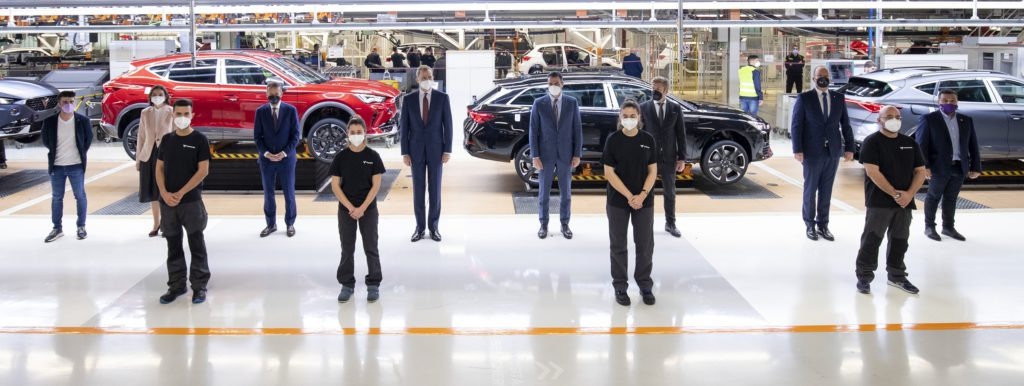SEAT sets sustainable sights on Spain
08 March 2021

SEAT celebrated its 70th anniversary by laying out an electrified vision of the future. The carmaker illustrated how public and private sectors could work together to advance Spanish electromobility.
During a celebratory visit from His Majesty King Felipe VI and Spanish Prime Minister Pedro Sánchez to the Spanish carmaker’s Martorell headquarters, Volkswagen Group (VW) CEO Herbert Diess, and SEAT president Wayne Griffiths, discussed the potential for a ′multisectoral alliance.’
As SEAT entered its seventh decade, it confirmed a new collaborative project. Reports point to a public-private consortium between the carmaker and energy company Iberdrola. The group looks to focus on establishing the country’s first factory for electrically-chargeable vehicle (EV) batteries.
Sustainable transformation
During the royal visit, VW, and its Spanish arm SEAT, underlined a common vision of the sustainable future of the automotive industry. The carmakers outlined the collaborative work needed to transform the industrial infrastructure and ecosystem for electric mobility, while accelerating recovery from COVID-19. Last year, the company announced a €5 billion electromobility investment plan until 2025.
As Europe’s second-largest automotive producer, the carmaker reasons that Spain will play a key role in meeting European Green Deal targets by 2030. Therefore, the acceleration of electric-vehicle ecosystems, stimulation of demand and development of the charging infrastructure, will be essential in the country. So, small EVs will be built locally in the factory, alongside local production of battery cells and modules.
′Spain can evolve into an e-mobility centre of Europe,’ said Diess. ′We share the Spanish Government’s vision: the transformation of the automotive industry.’ He went on to say that the modernisation of industrial structures and the creation of future-proof jobs can act as a blueprint for the whole region. ′We hope that the EU Commission has the political willingness to let this flagship project with historic importance for Spain become reality,’ Diess added.
′70 years ago, we put this country on wheels. Our aim, now, is to put Spain on electric wheels,’ said Griffiths. ′For this to be a reality, all parties agreed that Spain needs to develop and ensure a wider recharging infrastructure throughout the territory and stimulate demand by incentives. Spain should jump on the electrification train.’ Public-private consortium A new VW and SEAT-led project focusing on advancing electromobility was also outlined during the royal visit. Expected to be a driving force for medium-sized companies, it will focus on collaboration with key bodies from other sectors, such as Iberdrola (energy), Telefónica (telecommunications), CaixaBan (financial), Asti (technology), and suppliers like Gestamp or AntolÃn. Iberdrola chairman Ignacio Galán expressed his excitement for the upcoming project. ′The SEAT and Volkswagen project with Iberdrola demonstrates Spain’s technological potential and will contribute to the country’s recovery plan,’ he said. Galán explained the project is a demonstration of the country’s technological potential, while marking a milestone in public-private collaboration.Spain and VW share a vision: To transform Europe’s second largest automotive industry. We have brought it to the starting line, want to electrify Martorell for sustainable mobility. It’s a historic chance, @EU_Commission. #GreenDeal @sanchezcastejon
″” Herbert Diess (@Herbert_Diess) March 5, 2021
Spain’s Industry Minister Reyes Maroto gave a sneak peek into what a project of this scale might involve. Speaking at an event organised by the UGT union, she pointed to government plans for a public-private consortium between VW, SEAT and Iberdrola. It would use European Union funds to build the country’s first EV-battery factory. As reported by Reuters, this open collective will help Spain boost the local production of EVs.🔊La ministra @MarotoReyes anuncia que el Gobierno creará un consorcio público-privado para montar la 1ª fábrica de baterÃas de España que garantizará la fabricación de un vehÃculo eléctrico conectado completo.
👉ðŸ»En el 28º Congreso @UGT_FICA âž•https://t.co/Y5wzGpb4xK pic.twitter.com/uxCVkO2NvR ″” Ministerio de Industria, Comercio y Turismo (@mincoturgob) March 4, 2021